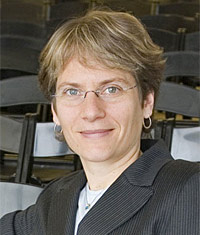Q&A: Carolyn Bertozzi on her love affair with sugar biology
Newly elected to the Institute of Medicine, the health arm of the National Academy of Sciences, Carolyn Bertozzi, professor of chemistry in the College of Chemistry, talks about her love of chemistry and the biology of sugars.
Q: What’s the primary focus of your research?

A:We focus on the development of chemical approaches to probing molecular function in living systems. An example is the development of bioorthogonal chemical reactions, which are reactions that take place in a cell without disrupting any of the cell’s own chemical reactions. These reactions can be harnessed to label biomolecules that help us image the insides of cells and animals. In my lab we apply these technologies to probing changes in glycosylation – the addition of sugar molecules – associated with cancer, with applications toward non-invasive imaging and identification of cancer biomarkers.
Q: What led you into research on the biology of sugar molecules?
A: I credit the UC Berkeley environment for catalyzing my interests in chemical biology and glycobiology from the outset, as I first learned about the opportunities in these fields as a graduate student in this very department. I was encouraged to join the lab of a new professor, Mark Bednarski, and he introduced me to the chemistry and biology of sugars. I have been enraptured by this still burgeoning area of science ever since, in light of the critical roles that sugars play in cell signaling, organ development, immunobiology and in numerous diseases.
Q: Do interactions with students help your research, or vice versa?
A: My research and teaching activities are mutually beneficial. I routinely integrate concepts from my research into lectures, and conversely, some of my most important ideas were nucleated during preparation of undergraduate lectures (typically for introductory level courses where one must revisit basic principles of chemistry).
Q: How might your research benefit society?
A: The technologies we develop facilitate fundamental studies of how biomolecules behave in their natural habitats, which is of interest to all biologists, and also have applications toward disease detection and diagnosis.
Q: How has being at UC Berkeley helped advance your work?
A: The work in my lab directly reflects the research interests of my students and postdoctoral fellows. And the projects we are actively pursuing represent just a fraction of the ideas these bright young scientists have brought to the table. Thus, Berkeley’s ability to attract the best and brightest talent has directly benefited my own scientific pursuits. As well, my colleagues are a continuous source of inspiration, and the facilities at Berkeley are largely unmatched by any institution, medical schools included. I could not have realized many of my ambitions in any other institution.
Q: What part of your research is the most satisfying?
A: Seeing students’ excitement when they make a new discovery or finally get a new technology that they invented to work.
